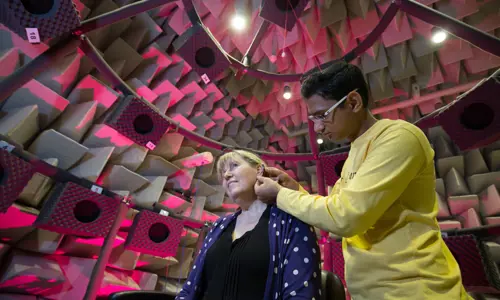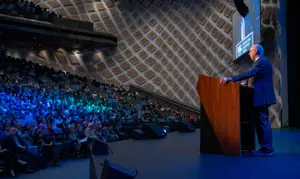Be the Voice: ASSTA’s impact on the international linguistics field

Bidding and hosting an international conference involves great leadership, team support and expert planning. With over 50 years’ experience, Business Events Sydney (BESydney) supports academic leaders with bidding advice, professional services, funding and delegate promotion to support your committee to deliver a world-class conference experience.
Associate Professor Michael Proctor from Macquarie University’s Department of Linguistics recently spoke about his experience of working on the successful bid to host the Interspeech 2026 Conference in Sydney, on behalf of the Australasian Speech Science and Technology Association (ASSTA).
Why bid for a global event?
Interspeech is the world’s largest and most comprehensive conference on the science and technology of spoken language processing. The conference will feature expert speakers, tutorials, oral and poster sessions, challenges, exhibitions and satellite events, and will draw around 1,200 participants from around the world to Sydney. Interspeech conferences emphasise interdisciplinary approaches addressing all aspects of speech science and technology.
Professor Proctor is Director of Research in the Department of Linguistics at Macquarie University, where he leads the Phonetics Laboratories. Under the leadership of Professor Felicity Cox at Macquarie University, Professor Proctor worked in partnership with Associate Professor Beena Ahmed and Associate Professor Vidhya Sethu at the University of NSW to prepare the bid on behalf of the Australasian Speech Science and Technology Association (ASSTA).
“Organising a major international conference is an important service to the scientific community,” says Professor Proctor. A primary motivation for bringing Interspeech 2026 to Sydney was to highlight the rich multilingual landscape of Australasia and refocus the energies of speech researchers and industry on under-resourced languages and speech in all its diversity. These themes guided the bid development and resonated with the international speech science community.
“Australasia has a long tradition of excellence in speech research but has only hosted Interspeech once before in Brisbane in 2008. Since then, Australia has grown and diversified into one of the most multilingual countries in the world, with new language varieties emerging in our vibrant cities,” stated Associate Professor Proctor.
Navigating the Bid Process
Working with BESydney, the bid committee were able to align the goals and requirements of the conference with local strengths and perspectives, positioning Sydney as the right choice for the next rotation of the international conference. Organising a successful bid campaign can offer broader perspectives on research disciplines and academic cultures by providing access to global networks and international societies that engage in different ways of working.
“Although I have previously been involved in the organisation of smaller scientific meetings, this is the first time I have been part of a team bidding for a major international conference.”
Professor Proctor added that “Bidding for and organising a global meeting is a wonderful opportunity to reconsider how we work and to learn from other perspectives and cultures. Hosting an international scientific conference provides a forum to highlight our work, and a unique opportunity for local students and researchers to engage with the international community in constructive service to our disciplines. It has been a wonderful opportunity to learn about the bidding process and to make a case for Sydney as the preferred destination for Interspeech.”
Showcasing Local Excellence
One of the primary opportunities associated with hosting your global meeting in Sydney is to showcase the strengths of your local research, industries and communities. The Interspeech bid team wanted to demonstrate the strength of speech research in Australasia and provide a platform for local researchers to engage with the international community. The chosen conference theme, “Diversity and Equity – Speaking Together,” highlights groundbreaking work on inclusivity and support for under-resourced languages and atypical speech.
Interspeech 2026 in Sydney will provide significant opportunities for Australasian researchers – especially students and early career researchers – to engage with a large, international association. This engagement is expected to catalyse more local activity in important growth areas such as machine learning and language modelling.
“Interspeech 2026 will be an important milestone for the Australasian Speech Science and Technology Association (ASSTA). After successfully hosting the International Congress of Phonetic Sciences (ICPhS) in Melbourne in 2019, this will be an opportunity to host another major international scientific meeting with a more technological focus, attracting an even wider range of researchers and reaching across a more diverse group of speech-related disciplines.
“It will also be an important forum to showcase work done by ASSTA members on indigenous language research and sociophonetics – two areas of particular interest and expertise in the Australasian speech research community.”
Looking Ahead
Interspeech 2026 will be held at the International Convention Centre (ICC) Sydney in October, with an estimated attendance of over 1,200 international delegates.
The larger bid team included colleagues from all major universities in Australia and New Zealand with active involvement in speech science, and they received invaluable insights and support from senior colleagues at International Speech Communication Association (ISCA). This collaborative effort ensured the development of a compelling bid which addressed all necessary aspects, from scientific content to logistical details.
As preparations for Interspeech 2026 continue, the Sydney 2026 team are focused on ensuring the conference is inclusive and representative of the diversity in speech and language research. They are planning initiatives to support work on lesser-studied languages and atypical speech and hearing, to make speech and language technologies more inclusive.
“In a time of increasing insularity and tribalism, we should embrace opportunities to bring people together from all over the world to focus on common interests and advancement of knowledge, and to turn our attention to global concerns and our shared humanity.”
*Photography credit: Chris Stacey, Macquarie University



